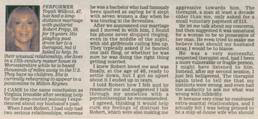 Therapy
On The Couch Therapy
On The Couch In Saturday's Mail, agony
aunt Virginia Ironside triggered a fierce debate
when she condemned therapy as a fraud. She wrote
that having spent £54,000 on different therapist
over many years, almost nothing had alleviated
her depression. So is she right that the
thousands of Britons who spend millions on
counselling every year are wasting their money?
Here, four celebrities who have been through
therapy give their own trenchant opinions on both
sides of the debate.
Performer
Toyah Willcox, 47, has had a long-distance
marriage with guitarist Robert Fripp, 59, for 19
years. His playboy past drove her to a therapist,
but it failed to help. In their unusual
relationship, she lives in a 17th-century manor
house in Worcestershire while he is based
thousands of miles away in the US. They have no
children. She is currently rehearsing to appear
in a pantomime in Milton Keynes.
I
came to the same conclusion as Virginia Ironside
after seeking help for the deep-rooted jealousy I
experienced about my husband's past.
When
I met Robert, I had only had two serious
relationships, whereas he was a bachelor who had
famously been quoted as saying he'd slept with
seven women a day when he was touring in the
seventies.
After
we announced our marriage and I moved in with
him, I found his phone never stopped ringing,
even in the middle of the night, with old
girlfriends calling him up. They typically asked
if he fancied one last fling, or whether he was
doing the right thing getting married.
I
knew Robert loved me and was finally, at the age
of 40, ready to settle down, but I got so upset
about it I ended up in tears.
I
told Robert how I felt and he reassured me and
suggested I talk through my anxieties with a
psychotherapist he recommended.
I
agreed, thinking it would help curb my feelings
of distrust for Robert, which were making me
aggressive towards him. The therapist, a man at
least a decade older than me, only asked for a
small voluntary payment of £15.
He
let me talk about my concerns, but then suggested
it was unnatural for a woman to be so possessive
of her man. He even tried to make me belive that
should my husband stray, I would be to
blame.
He
was a very successful, respected therapist and
had I been a more vulnerable or fragile person, I
might have listened to him. Instead, after my
second session, I just felt belligerent. The
therapist again tried to tell me that my
instincts were wrong, and even had the audacity
to ask me what was wrong with infidelity.
It
became very clear he condoned extra-marital
relationships, and I actually felt I was being
primed to be a stay-at-home wife who should turn
a blind eye to any infidelities. The therapist
was following his own agenda, not mine, and his
behaviour was remarkably dangerous. I don't like
to think what might happen if he gets hold of a
weaker character.
Fortunately,
I stopped our sessions there and then. Later, I
doscovered he'd had an affair with at least one
of his female patients, so my instincts had been
correct.
Robert
and I did survive because we spent a few days
seeing an American relationship counsellor
together, who talked common sense and made us
realise that we both had to acknowledge each
other's history and move on together, which we
have done very happily.
That
kind of positive help can be useful. It's the
counselling which makes you feel worse about
yourself which is so damaging.
Daily
Mail
25th November 2005
Thanks to Alec kelly
|